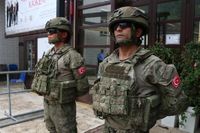TALLINN — In late April 2025, the 193-meter Hartland Point cargo vessel pulled into a harbor in northern Estonia, marking a significant logistical operation for NATO. After a 48-hour journey, the vessel disgorged equipment for hundreds of soldiers from the British Army’s Yorkshire-based combat brigade, known as the Black Rats. This movement of troops and supplies is part of NATO's ongoing efforts to reassure its Eastern European allies amid rising tensions with Russia.
The arrival of the Black Rats in Estonia comes at a time when NATO is ramping up its military presence in Eastern Europe, particularly in the Baltic states. The alliance aims to bolster its defenses in response to perceived threats from Russia, especially following its invasion of Ukraine in 2022. This military buildup is designed not only to enhance deterrence but also to provide a visible sign of solidarity with member nations that share borders with Russia.
Meanwhile, Türkiye is set to reassume command of the NATO-led Kosovo Force (KFOR) in October 2025 for a one-year term. The Turkish Ministry of National Defense announced that this will follow its previous leadership during the 2023–2024 period. Rear Admiral Zeki Akturk, spokesperson for the ministry, stated, "Our country, which has made significant and decisive contributions to the security of NATO and the Euro-Atlantic region in the past, continues to do so today and will do so in the future." This renewed leadership underscores Türkiye's growing strategic role in maintaining stability in the Western Balkans.
KFOR was established on June 12, 1999, under a United Nations Security Council resolution to support peace and stability in Kosovo. Currently, the force includes around 4,500 military personnel from 29 NATO and non-NATO countries. Türkiye has been a consistent contributor to KFOR since its inception, and its renewed command is expected to further enhance peacekeeping efforts in the region.
Akturk also highlighted a notable development in NATO's structure: for the first time in its history, a Turkish general has been appointed as NATO’s Director of Security Cooperation. This position, based at NATO’s International Military Headquarters in Brussels, is seen as a significant indicator of Türkiye’s effective role within NATO and its contributions to the alliance’s security and stability.
The backdrop of Türkiye's renewed leadership of KFOR is the ongoing fragility in the Balkans, which has become more apparent since Russia's actions in Ukraine. Türkiye has long positioned itself as a mediator in the Serbia-Kosovo dispute, helping to ease tensions through diplomatic engagement. Since Kosovo’s unilateral declaration of independence in 2008, which Serbia has not recognized, Türkiye has played a consistent role in supporting peace efforts in the region.
The return of Turkish command in 2025 is viewed as a continuation of efforts to stabilize a volatile and unpredictable security environment in the Balkans. The KFOR mission is crucial in maintaining peace in the region, especially in light of the historical tensions between Serbia and Kosovo.
As NATO continues to navigate the complexities of security in Europe, the collaboration between member states like Türkiye and the United Kingdom highlights the alliance's commitment to collective defense. The deployment of British troops to Estonia and the leadership of KFOR by Türkiye exemplify the multifaceted approach NATO is taking to address both immediate and long-term security challenges.
The situation in Eastern Europe remains dynamic, with NATO's military exercises and troop deployments serving as a deterrent against potential aggression from Russia. The alliance's strategy reflects a recognition of the need for a robust defense posture in the face of evolving threats.
In conclusion, the activities of NATO in both the Baltic region and the Balkans illustrate the alliance's proactive stance in ensuring stability and security across Europe. As member states work together to address these challenges, the importance of international cooperation and commitment to shared values remains paramount.




